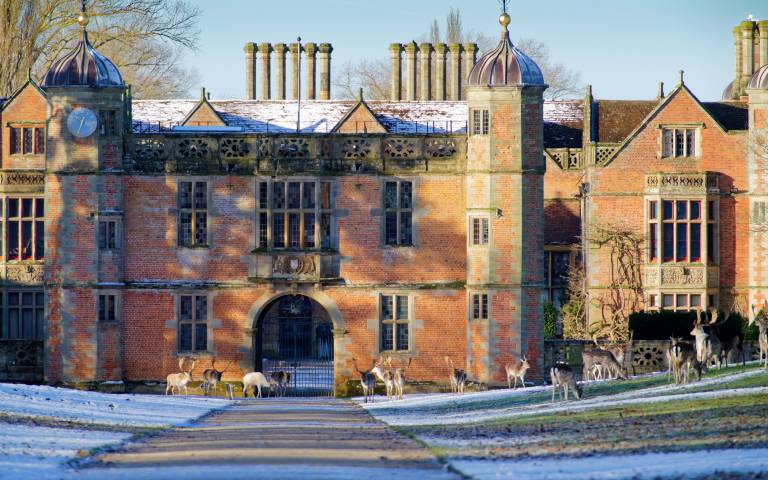IEDE and Historic England announce Fully Funded PhD Studentship
6 June 2019
This fully funded PhD Studentship is in reducing energy consumption and addressing thermal discomfort in historic buildings.

Details
- Title: Reducing energy consumption and the unintended consequences of energy efficient intervention in historic buildings: understanding, assessing and addressing thermal discomfort
- Supervisors: Dr Hector Altamirano, UCL Institute for Environmental Design and Engineering; Dr Robyn Pender, Technical Conservation Department, Historic England
- Stipend: £17,009 plus fees of £5,210 (2019-20 figures) plus funds for travel and laboratory activities
- Start Date: September/October 2019
- Funding Duration: 3.5 years
- Funding: Engineering and Physical Sciences Research Council (EPSRC); Historic England
- Eligibility: please check https://www.epsrc.ac.uk/skills/students/help/eligibility/
Background: Older historic buildings are often perceived as energy-hungry. The opposite is arguably the case. Until the Industrial Revolution, energy was expensive and difficult to exploit. Acceptable indoor air conditions had to be delivered with little or no input from “building services” such as heating. Instead, massive walls and floors provided thermal buffering from exterior conditions; barriers such as timber panelling prevented them drawing out the body heat of occupants.
These and many other comfort and energy-saving features – and the knowledge underpinning them – were largely lost as centralised energy supplies encouraged the development of building services such as space heating and cooling. The introduction of thermometers completed a shift away from building users’ understanding of complex sources of discomfort towards an emphasis on air temperature.
The energy- and carbon-saving measures currently promoted for the built environment centre on air temperature, cutting the loss of conditioned air by reducing ventilation and increasing insulation of the building envelope. These retrofits can have serious negative impacts on traditionally constructed “greatcoat” buildings, which depend on very different materials and systems to control moisture from those used in modern “raincoat” construction. Maladaptation can lead to failure of the building fabric, increased use of energy and carbon, and serious comfort and health issues.
Air temperature is an easy parameter to measure, but – as recent research has demonstrated – comfort and discomfort are considerably more subtle. This project aims to broaden our understanding of the causes of thermal discomfort, investigate innovative ways of assessing it, and quantify the benefits (for the user, the building fabric, and the environment) of traditional approaches to remediation.
Aims
- summarise the unintended consequences associated with current thermal-comfort criteria
- identify the specific factors that most influence thermal discomfort in historic buildings
- develop innovative methodologies for quantifying building user discomfort
- quantify the benefits of these methodologies for energy and carbon reduction in historic buildings, including the avoidance of unintended consequences for the building fabric.
Research hypotheses
1: Parameters including air movement (draughtiness), relative humidity, ambient humidity, conductive and radiant body heat loss, and user activity play a much more important role in thermal comfort and discomfort than air temperature.
2: Traditional ways of managing thermal discomfort can significantly reduce the pressure on air heating and cooling systems, allowing a reduction in energy and carbon use without negative impacts on building usability or historic building fabric.
3: Robust ways of assessing and dealing with the real causes of thermal discomfort could help achieve important through-life reductions in the consumption of energy and carbon in buildings.
Person specification
Applicants should have:
- an undergraduate degree (minimum 2:1) in a relevant discipline (engineering, physics, material science, architecture, conservation, heritage science)
- a demonstrable interest in the history of construction.
- the ability to use initiative, prioritise and manage complex research options.
- excellent interpersonal and communication skills (oral and written).
- a high level of attention to detail in working methods.
The project would suit a candidate with a multidisciplinary background. Experience of working with energy and buildings would be extremely helpful, but is not required.
Application Procedure
Email a pre-application to Athina Benia (bseer-phd-admin@ucl.ac.uk) with “EPSRC – Historic England” as the subject. Do not use the UCL online admissions system.
The deadline for applications is: 09.00 (BST) 22nd July 2019
Please include:
- A covering letter, stating your motivation and eligibility according to these guidelines: www.epsrc.ac.uk/skills/students/help/eligibility/
- Your CV
- The names and addresses of two academic referees
- A copy of your degree certificate(s) and transcript(s) of degree(s)
- A research proposal (max. 2000 words), which takes into consideration the project research questions
Informal enquiries on the content of the research topic or your eligibility should be emailed to Dr Hector Altamirano Medina (h.altamirano-medina@ucl.ac.uk).
 Close
Close

